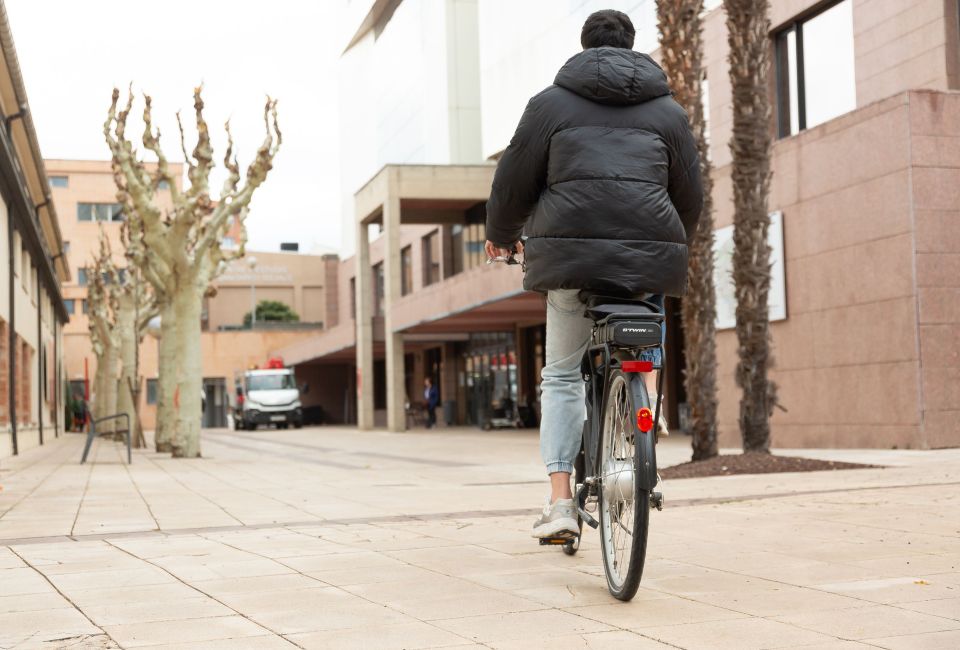
UVic-UCC and the Catalan National Physical Education Institute (INEFC) coordinate the development of a WHO guide to promote physical exercise in small and medium-sized enterprises
Around 10,000 people die in Europe every year as a result of insufficient physical exercise, and sedentary working environments are one of the causes. Spending too much time sitting down is a health risk factor that is linked to heart disease, cancer, type 2 diabetes and other non-communicable diseases. Based on this evidence, the World Health Organization (WHO) has recently published the guide entitled Promotion of health-enhancing physical activity in small- to medium-sized enterprises, which aims to promote physical exercise and people's well-being in their working environments, and in small and medium enterprises in particular.
The University of Vic - Universitat Central de Catalunya (UVic-UCC) and the INEFC have led the production of this guide by means of a knowledge transfer through the WHO Workplace HEPA working group. The coordinators of the team were Anna Puig-Ribera, a researcher in the Sport and Physical Activity Research Group (GREAF) at UVic-UCC, Sebastià Mas-Alòs, a researcher in the Human Movement Research Group at INEFC-UdL, Ilkka Väänänen, a researcher at the LAB University of Applied Sciences, and Ine De Clerk, a researcher at the Artevelnde University of Applied Sciences. Other contributors were Anna Codina-Nadal, a researcher at the GREAF at UVic-UCC, and Sergi Matas, Estela Farías and Víctor Dorado, at the INEFC in Lleida. Experts from Cyprus, Denmark, England, France, Jamaica, the Netherlands, Portugal, Scotland, Spain, Sweden and Switzerland, and from universities in Finland and Belgium also participated in the project.
Given that 99% of companies in the EU are SMEs, and that health promotion policies and initiatives for their workers are an issue that is often overlooked, this guide provides several recommendations based on organisational flexibility in SMEs. The document, produced by the WHO Regional Office for Europe, contains practical and creative strategies that small and medium-sized enterprises can easily include in their daily routines in order to create a healthier environment for their workers. These strategies include organising walking meetings, encouraging the use of stairs and promoting cycle-to-work schemes.
Around seventy initiatives and ten practical proposals
The guide, titled Promotion of health-enhancing physical activity in small- to medium-sized enterprises contains around seventy real initiatives classified into five main groups. The first group is related to active work, active travel and active living. It identifies eleven initiatives, ranging from encouraging flexible working hours to organising sports events and competitions at work. The second group of initiatives is linked to exercise programming, exercise training and healthcare services. This category contains twenty-six real proposals, including everything from meditation and relaxation exercises to ergonomic and postural assessments for workers.
The third group contains eight initiatives related to management and leadership, ranging from providing vouchers for employees to join a gym to providing a preventive healthcare system and creating policies to encourage workers to be more physically active. The fourth group of initiatives are those related to communication and dissemination. There are eleven initiatives in this group, including organising conferences, seminars and lectures, using social media and using internal communication channels, etc. Finally, the fifth group contains twelve initiatives related to SMEs' supplies and premises, which range from providing bicycle parking facilities to creating open spaces in the workplace which workers can use for sports.
However, to facilitate the implementation of the guide's recommendations, a list of the ten main interventions that the evidence suggests are most practical and feasible to carry out is presented at the end of the document. These ten proposals are: a campaign to encourage cycling to work that may include competitions; holding active meetings while walking; providing information for employees through about the benefits of physical exercise different communication channels; a campaign to encourage employees to take short walks every day; providing a physiotherapy service; organising short daily short warm-up exercises; providing support for individual behaviour change strategies; encouraging the use of stairs in the workplace; preparing a plan of physical activities with different levels of difficulty; and organising sports competitions in the company.
The method
"The guide aims to promote physical activity in work environments, so that it ends up having an impact on an improvement in the well-being of workers and reducing stress, but also in terms of greater satisfaction with the workplace itself, so that absenteeism is reduced and productivity improves," explains Anna Puig-Ribera. The guide was drawn up based on an initial search for real initiatives promoting physical activity in the workplace across Europe. The authors identified 713, and drafted a detailed description of the method used and created a database with the characteristics of the workplaces. All the initiatives for physical exercise were classified into twelve areas and twenty sub-areas.
The second part of the project consisted of carrying out surveys to find out which initiatives were the most viable. A total of 390 proposals were considered, and 17% of them were found not to be feasible.
Cada any es produeixen a Europa unes 10.000 morts a conseqüència d’una activitat física insuficient i una de les causes són els entorns laborals sedentaris. Passar massa temps assegut és un factor de risc per a la salut que es relaciona amb malalties del cor, càncer, diabetis tipus 2 i altres malalties no transmissibles. Partint d’aquesta evidència, l’Organització Mundial de la Salut (OMS) acaba de publicar la guia Promotion of health-enhancing physical activity in small- to medium-sized enterprises, amb l’objectiu de fomentar l’activitat física i el benestar de les persones als seus entorns laborals, especialment a les petites i mitjanes empreses.